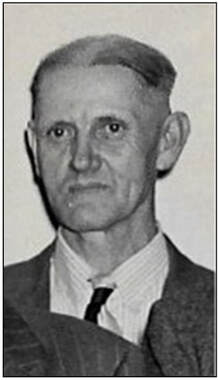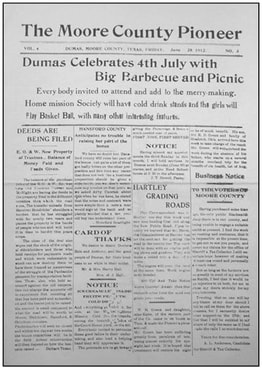JP Played Organ in Courthouse
 R. E. "Bob" Sims
R. E. "Bob" Sims
Unusual sounds came from the courthouse when R. E. "Bob" Sims was Justice of the Peace and had his office there.
The Episcopal Church was meeting in the courthouse and stored their organ in the Justice's office. When he was not busy with his justice duties, he would play the organ, sometimes all day.
Bob enjoyed music and taught himself to play the French harp, piano and organ. Once, he bought himself an organ and was bringing it home on the back of a pickup. A woman saw it and offered him $100 for it. Since he had only paid $25 for the instrument, he agreed to sell it.
Bob was born in Springfield, MO, on September 10, 1886. He came to the Panhandle by train when he was 21 years old.
He found only nine homes in Dumas, a school, courthouse, blacksmith shop, a general store and one church. He remembered, "When I got here, there were only 75 voters in the county. Of course, women couldn't vote then. It took every man in the county to hold court."
The one church was a Methodist church on Porter Street across west of the bowling alley. "Out of town church goers would either go to friend's houses for lunch or eat on the grounds of the courthouse," according to Bob.
Bob had a variety of jobs. In 1909 and 1910, he and J. M. Daughtery owned the first meat market located on East Seventh. Just down the street was the first newspaper, The Moore County Pioneer, owned by Daughtery. Bob worked for the Pioneer and also for the printing company. The newspaper was sold in 1912 to H. Lyle Johnston and he moved it to Texline. Bob went to work for the Channing Courier.
The Episcopal Church was meeting in the courthouse and stored their organ in the Justice's office. When he was not busy with his justice duties, he would play the organ, sometimes all day.
Bob enjoyed music and taught himself to play the French harp, piano and organ. Once, he bought himself an organ and was bringing it home on the back of a pickup. A woman saw it and offered him $100 for it. Since he had only paid $25 for the instrument, he agreed to sell it.
Bob was born in Springfield, MO, on September 10, 1886. He came to the Panhandle by train when he was 21 years old.
He found only nine homes in Dumas, a school, courthouse, blacksmith shop, a general store and one church. He remembered, "When I got here, there were only 75 voters in the county. Of course, women couldn't vote then. It took every man in the county to hold court."
The one church was a Methodist church on Porter Street across west of the bowling alley. "Out of town church goers would either go to friend's houses for lunch or eat on the grounds of the courthouse," according to Bob.
Bob had a variety of jobs. In 1909 and 1910, he and J. M. Daughtery owned the first meat market located on East Seventh. Just down the street was the first newspaper, The Moore County Pioneer, owned by Daughtery. Bob worked for the Pioneer and also for the printing company. The newspaper was sold in 1912 to H. Lyle Johnston and he moved it to Texline. Bob went to work for the Channing Courier.
 Bob Sims worked for The Moore County Pioneer.
Bob Sims worked for The Moore County Pioneer.
Between 1914 and 1928, he worked as a farmer. In 1931, he became janitor of the newly built courthouse. He worked as a farm implement salesman and also for the highway department as a maintainer operator.
He entered politics in 1939 when he ran for Justice of the Peace, Precinct 1, against four other candidates. He and Hamp Love had a run-ff election and Bob won by 48 votes. He was sworn in that following January and held that position until his retirement in 1967 and Arthur Ullom became the new JP.
A quote from Bob in a story in The Windswept Land, he said, "For entertainment, everyone would drive for miles to a dance. They would dance when the sun went down and dance until sun-up and from there go straight to work. Dances were held in homes or any place there was room."
In the interview, Bob remembered the dust storm of 1935. He was sitting in front of the courthouse with Sheriff and Mrs. Chester Logue. He went home and couldn't tell when he was in the house, the dust was so thick. His two boys were down in the breaks with three other boys.
They followed the fence to town and then went down the highway until George Brown picked them up and took them home.
During his time as justice of the peace, he never took a vacation and was always available when he was needed.
He made it a habit to visit prisoners in the county jail every Christmas.
He was the father of four children, Robert E., Junette, Bill and Josie.
He entered politics in 1939 when he ran for Justice of the Peace, Precinct 1, against four other candidates. He and Hamp Love had a run-ff election and Bob won by 48 votes. He was sworn in that following January and held that position until his retirement in 1967 and Arthur Ullom became the new JP.
A quote from Bob in a story in The Windswept Land, he said, "For entertainment, everyone would drive for miles to a dance. They would dance when the sun went down and dance until sun-up and from there go straight to work. Dances were held in homes or any place there was room."
In the interview, Bob remembered the dust storm of 1935. He was sitting in front of the courthouse with Sheriff and Mrs. Chester Logue. He went home and couldn't tell when he was in the house, the dust was so thick. His two boys were down in the breaks with three other boys.
They followed the fence to town and then went down the highway until George Brown picked them up and took them home.
During his time as justice of the peace, he never took a vacation and was always available when he was needed.
He made it a habit to visit prisoners in the county jail every Christmas.
He was the father of four children, Robert E., Junette, Bill and Josie.